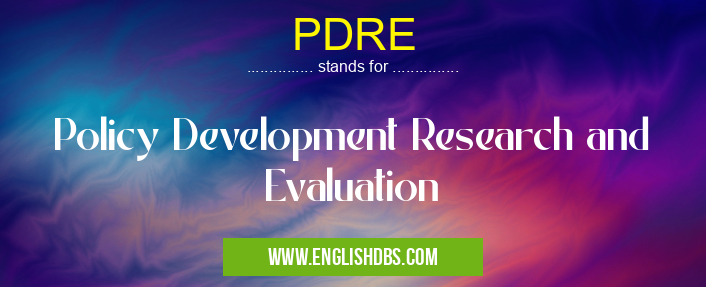What does PDRE mean in DEVELOPMENT
PDRE stands for Policy Development Research and Evaluation. It is a comprehensive process that involves the development, implementation, and evaluation of policies to address various social, economic, and environmental issues within a community.

PDRE meaning in Development in Community
PDRE mostly used in an acronym Development in Category Community that means Policy Development Research and Evaluation
Shorthand: PDRE,
Full Form: Policy Development Research and Evaluation
For more information of "Policy Development Research and Evaluation", see the section below.
» Community » Development
Key Features of PDRE
- Policy Development: Involves identifying the need for a policy, researching potential solutions, and formulating a plan of action.
- Research: Conducts rigorous research to gather evidence and analyze the potential impact of proposed policies.
- Evaluation: Assesses the effectiveness of implemented policies, identifying areas for improvement and ensuring accountability.
Benefits of PDRE
- Evidence-Based Decision Making: Provides data and analysis to inform policy decisions, ensuring they are grounded in sound evidence.
- Improved Policy Outcomes: By evaluating policies, identifying weaknesses, and making necessary adjustments, PDRE enhances policy effectiveness.
- Accountability and Transparency: Requires ongoing monitoring and evaluation, ensuring that policies are meeting their intended goals and are transparent to the community.
Roles in Community
PDRE plays a vital role in the development and implementation of policies that impact the lives of community members. It involves stakeholders at various levels, including:
- Policymakers: Develop and enact policies based on research and evaluation findings.
- Researchers: Conduct research, analyze data, and provide evidence to inform policy decisions.
- Community Members: Engage in policy development and evaluation processes, providing feedback and input.
Essential Questions and Answers on Policy Development Research and Evaluation in "COMMUNITY»DEVELOPMENT"
What is PDRE?
PDRE stands for Policy Development Research and Evaluation. It is a specialized field that involves conducting research and evaluation to inform and support the development and implementation of public policies.
What is the role of PDRE in policymaking?
PDRE plays a crucial role by providing evidence-based insights to policymakers. Researchers and evaluators conduct studies to assess the effectiveness, impact, and feasibility of proposed policies, helping policymakers make informed decisions and enhance the quality of public interventions.
What types of research methods are used in PDRE?
PDRE employs a wide range of research methods, including quantitative analysis, qualitative research, mixed methods studies, and experimental designs. The choice of method depends on the specific policy question being addressed and the availability of data.
What are the benefits of PDRE?
PDRE offers several benefits, including:
- Improved decision-making based on evidence
- Increased accountability and transparency in policy development
- Identification of effective and efficient policy solutions
- Optimization of resource allocation
- Enhanced public trust in government policies
How can I become involved in PDRE?
There are several ways to get involved in PDRE:
- Pursue a degree in a related field, such as public policy, political science, or economics
- Seek employment in a research or evaluation organization
- Volunteer with non-profit organizations involved in policy research and advocacy
- Participate in citizen advisory boards or community engagement initiatives
Final Words: PDRE is an essential process for developing and implementing effective policies that address the needs of communities. By promoting evidence-based decision making, improving policy outcomes, and ensuring accountability, PDRE contributes to the well-being and progress of communities.
